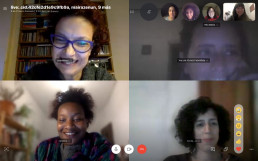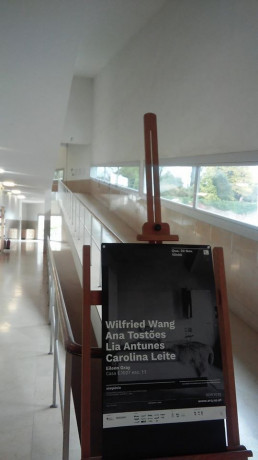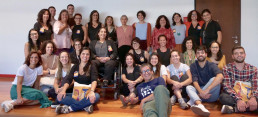Editing Wikipedia pages with Wiki Editoras Lx | session 1
Early in physical confinement due to the covid-19 pandemic, we joined the group of women Wiki Editoras Lx. Continuing the bi-monthly meetings, now in online format, we started creating and editing Wikipedia pages with biographies of women and non-binary people - residuals in this global encyclopedia. Because who is not mentioned, does not exist!
Thank you for welcoming us so well!
Eileen Gray, Total Art: house E.1027 to scale 1:1
On November 20, 2019, the researcher of the project W@ARCH.PT, Lia Gil Antunes, participated as a speaker in the symposium of the exhibition opening "Eileen Gray, Total Art: house E.1027 to scale 1:1", invited by the architect Carolina Leite, in the city of Porto. The event was organized by the Faculty of Architecture of the University of Porto (FAUP) in partnership with O’Neil Ford Chair in Architecture at University of Texas at Austin, USA. For the first time in this school we talked about how to “Get out of the Shadow” and presented the research project W@ARCH.PT and women architects in Portugal.
Full symposium available on video.
Summer School "Cities and Gender: Perspectives and Strategies"
For the first time in Portugal there was a school dedicated to themes of architecture and the city with a gender perspective. With the co-organization of the Mulheres na Arquitectura association (Women in Architecture), the research project W@ARCH.PT and the BIP / ZIP project "Um Género de Escola!", The application of a reflective and participative methodology, with a gender perspective, was privileged. Between the 18th and 20th of September 2019, at CIULisboa, the Summer School "Cities and Gender: Perspectives and Strategies", brought together students of architecture, technicians of city councils and people related to associations, from different parts of the country, with national and international experts.
During 3 days, conferences, workshops, urban walks, viewing and debating films, made it possible to understand the possibilities of strategies for: 1. Visibility and reinforcement of professionals (architects, urban planners, etc.) in places of technical and political decision; 2. Questioning about the urban consolidation of inequalities and the consequent socio-spatial resistances and 3. Assessment of consolidated or developing urban realities and processes and necessary strategies. The essential objective was fulfilled: to create safe and debate environments that allow learning and working with tools that aim at building more solid urban intervention strategies with an awareness of diversity, for an inclusive daily life.



